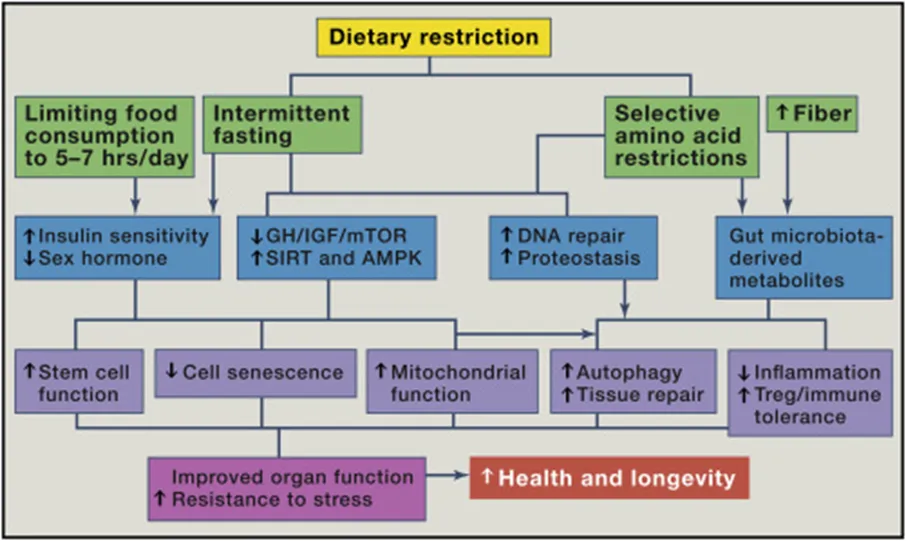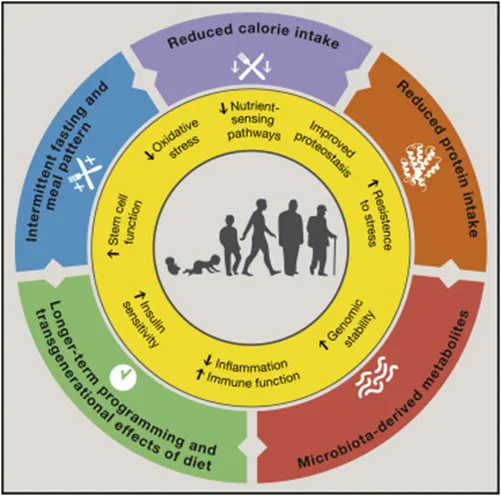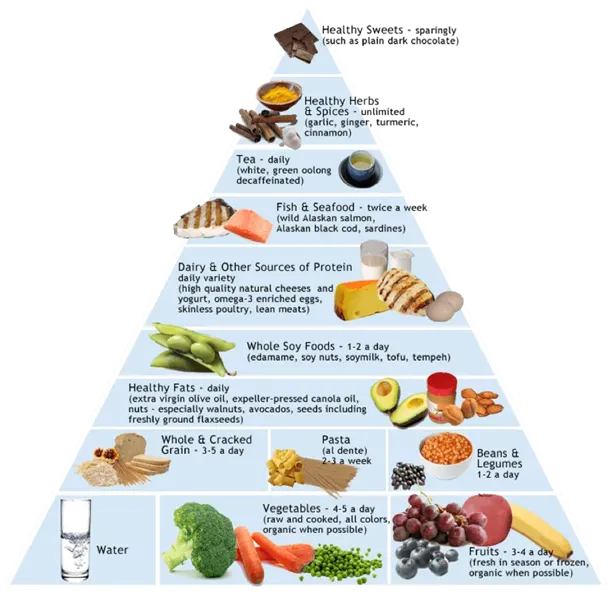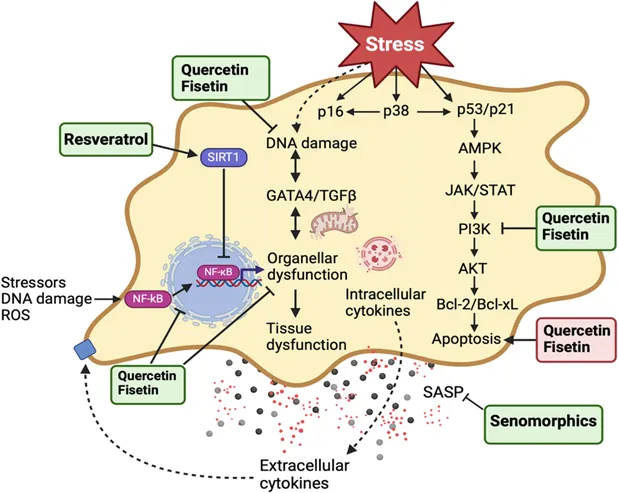The Role of Diet and Nutrition in Extending Life Span
Discover how a diet for longevity can boost your lifespan and healthspan. This article explores the science behind...
Introduction: Food as a Tool for Longevity
The food we eat profoundly influences our health and lifespan, acting as one of the most modifiable determinants of aging. Beyond providing energy, diet shapes the molecular pathways that regulate biological aging, including oxidative stress, inflammation, mitochondrial function, and DNA repair. Adopting a diet for longevity can slow these processes, enhance healthspan—the portion of life spent in good health—and reduce the risk of chronic diseases such as cardiovascular disease, diabetes, and neurodegenerative disorders (López-Otín et al., 2013).
Recent research highlights that dietary interventions, such as calorie restriction and plant-based eating, promote cellular repair and improve metabolic flexibility, mimicking mechanisms seen in long-lived populations (Fontana & Partridge, 2015). The dietary patterns observed in Blue Zones—regions with the world’s longest-living populations—exemplify the importance of nutrient-dense, minimally processed foods. For example, the diets of Okinawan and Sardinian centenarians emphasize anti-inflammatory foods, lean proteins, and life-extending nutrients, showcasing how food can directly influence longevity (Buettner, 2005).


Additionally, nutritional supplements for aging, such as NAD+ precursors and Urolithin A, complement a healthy diet by targeting cellular pathways involved in aging. By integrating these strategies, individuals can proactively influence their aging process and improve quality of life.
Key Nutrients for Healthy Aging
Aging is an intricate biological process influenced by genetic, environmental, and lifestyle factors. Among these, nutrition plays a central role in determining the quality and duration of life. The foods we consume supply the building blocks for cellular repair, energy production, and immune function—critical processes that often deteriorate as we age. While no single nutrient can stop aging, certain compounds have been identified as life-extending nutrients that optimize cellular health, reduce inflammation, and delay the onset of age-related diseases.
Nutritional science has revealed that a nutrient-rich diet can directly target hallmarks of aging, such as oxidative stress, mitochondrial dysfunction, and DNA damage. For instance, omega-3 fatty acids support heart and brain health, while polyphenols act as antioxidants that protect against free radical damage. Similarly, micronutrients like Vitamin D, selenium, and zinc help regulate immune responses, which are often impaired in older adults. These nutrients not only enhance longevity but also improve healthspan, ensuring that the added years are spent in good health.
Understanding the role of life-extending nutrients allows us to tailor our diets to meet the demands of an aging body. By prioritizing foods rich in essential nutrients, we can slow biological aging and increase resilience against chronic diseases, ultimately supporting a healthy diet for aging. Below, we explore key nutrients that play a pivotal role in promoting longevity and their specific mechanisms of action.
Omega-3 Fatty Acids
Omega-3 fatty acids, particularly EPA and DHA, are essential fats with powerful anti-inflammatory properties. Found in fatty fish (e.g., salmon, mackerel), walnuts, and flaxseeds, omega-3s improve cardiovascular health by reducing triglycerides and preventing arterial plaque buildup. They also support cognitive function by reducing neuroinflammation, a key contributor to Alzheimer’s disease (Farzaneh-Far et al., 2010).
A meta-analysis in Circulation demonstrated that individuals with higher omega-3 levels had a 15% reduction in cardiovascular events and a slower rate of telomere shortening—a hallmark of cellular aging (Mozaffarian & Wu, 2011). Omega-3 supplementation also enhances mitochondrial efficiency, supporting sustained energy production in aging cells.
Polyphenols
Polyphenols are a group of plant-derived antioxidants found in berries, tea, dark chocolate, and red wine. They neutralize free radicals, reducing oxidative stress and inflammation. Resveratrol, a polyphenol in red wine, has been shown to activate sirtuins, proteins involved in DNA repair and metabolic regulation, which are associated with longer lifespan (Fontana & Partridge, 2015).
Additionally, polyphenols improve gut health by promoting the growth of beneficial bacteria, indirectly reducing systemic inflammation. A study in Nutrients highlighted that individuals consuming polyphenol-rich diets had lower levels of inflammatory biomarkers and a reduced risk of chronic diseases (Vauzour et al., 2010).
Vitamin D
Vitamin D is vital for bone health, immune regulation, and the prevention of age-related diseases such as osteoporosis and cardiovascular conditions. Deficiency in Vitamin D has been linked to frailty, increased mortality, and a higher risk of infections in older adults (Holick, 2007). Sunlight, fatty fish, and fortified foods are primary sources of Vitamin D, and supplementation is often necessary for individuals in regions with limited sun exposure.
Fiber
Fiber, found in whole grains, legumes, and vegetables, promotes gut microbiome diversity, stabilizes blood sugar, and lowers cholesterol. A balanced gut microbiome reduces chronic inflammation, a major driver of aging. Studies indicate that high-fiber diets are associated with a 30% lower risk of cardiovascular disease and type 2 diabetes (O’Keefe et al., 2017).
Anti-Inflammatory Diets and Aging
Chronic inflammation, often termed "inflammaging," is a persistent, low-grade inflammatory state that develops with age and is a significant contributor to aging and age-related diseases. Unlike acute inflammation, which is a necessary and beneficial response to injury or infection, chronic inflammation disrupts cellular processes, damages tissues, and accelerates the aging of organs. This underlying inflammatory state has been linked to conditions such as cardiovascular disease, diabetes, arthritis, and neurodegenerative disorders like Alzheimer’s disease (Franceschi et al., 2018).
An anti-inflammatory diet has emerged as one of the most effective strategies to counteract the damaging effects of inflammaging. By focusing on nutrient-dense, plant-based, and minimally processed foods, this dietary approach can lower pro-inflammatory markers such as C-reactive protein (CRP) and interleukin-6 (IL-6). Research consistently demonstrates that individuals adhering to anti-inflammatory diets, such as the Mediterranean or DASH diets, experience slower biological aging, reduced risk of chronic disease, and longer healthspan (Martínez-González et al., 2017).

Beyond disease prevention, an anti-inflammatory dietary pattern supports overall wellness by improving energy metabolism, maintaining healthy immune function, and enhancing cognitive performance. The synergy of whole foods, rich in antioxidants, omega-3 fatty acids, and polyphenols, works to neutralize oxidative stress and promote cellular resilience.
In this section, we explore the principles of an anti-inflammatory diet, its key components, and the mechanisms by which it mitigates age-related inflammation, ensuring that longevity is not only measured in years but also in quality of life.
The Mediterranean Diet
The Mediterranean diet is widely regarded as the gold standard for reducing inflammation and promoting longevity. Rich in olive oil, nuts, whole grains, and vegetables, this diet significantly lowers inflammatory biomarkers like CRP and IL-6. A 20-year longitudinal study in PLOS Medicine found that adherence to the Mediterranean diet reduced all-cause mortality by 25% (Trichopoulou et al., 2003).
Functional Foods and Spices
Spices such as turmeric, ginger, and cinnamon are potent anti-inflammatory agents. Curcumin, the active compound in turmeric, inhibits NF-kB activity, a major driver of chronic inflammation. Similarly, gingerol in ginger reduces oxidative stress and inflammation in tissues, enhancing overall healthspan (Aggarwal & Harikumar, 2009).
How Specific Foods Influence Longevity
Certain foods are particularly effective at promoting healthspan and longevity due to their unique bioactive compounds. These anti-aging foods work by activating pathways that support cellular repair, metabolic flexibility, and detoxification, while also reducing oxidative stress and inflammation.
Cruciferous Vegetables
Cruciferous vegetables like broccoli, kale, and Brussels sprouts are nutrient-dense and rich in sulforaphane, a phytochemical that activates detoxification enzymes and protects DNA from oxidative stress. Sulforaphane has been shown to modulate the expression of genes involved in antioxidant responses, enhancing the body’s ability to neutralize harmful compounds. Studies in Cancer Epidemiology, Biomarkers & Prevention suggest that regular consumption of cruciferous vegetables reduces the risk of chronic diseases such as cancer and cardiovascular conditions (Fahey et al., 2015). These vegetables also contain indole-3-carbinol, which supports hormonal balance by metabolizing excess estrogens.
Berries
Blueberries, blackberries, and strawberries are rich in anthocyanins and flavonoids, antioxidants that combat oxidative stress and reduce inflammation. A study published in Annals of Neurology found that higher berry consumption was associated with delayed cognitive decline in older adults (Devore et al., 2012). The polyphenols in berries also support vascular health by improving endothelial function, reducing blood pressure, and enhancing blood flow to the brain.
Fermented Foods
Fermented foods such as yogurt, kimchi, and kefir play a vital role in maintaining gut health. They are rich in probiotics, beneficial bacteria that enhance gut microbiome diversity. A balanced microbiome supports nutrient absorption, regulates immune responses, and reduces systemic inflammation. Research in Frontiers in Immunology highlights the connection between gut health and longevity, with a diverse microbiome being linked to improved resilience against age-related diseases (O’Toole & Jeffery, 2015).
Nuts and Seeds
Nuts and seeds like walnuts, almonds, and flaxseeds are excellent sources of healthy fats, protein, and antioxidants. Walnuts, for instance, are rich in omega-3 fatty acids and polyphenols, which have been shown to reduce oxidative stress and inflammation. Studies in BMC Medicine indicate that regular nut consumption is associated with lower all-cause mortality and reduced risks of heart disease and cancer (Guasch-Ferré et al., 2017).
Legumes and Whole Grains
Legumes like lentils, chickpeas, and black beans, as well as whole grains such as quinoa and oats, provide plant-based protein, complex carbohydrates, and essential nutrients like magnesium and potassium. These foods help stabilize blood sugar levels, reduce cholesterol, and promote gut health by feeding beneficial bacteria. Their low glycemic index and high fiber content make them ideal for reducing the risk of metabolic disorders and cardiovascular disease.
Supplements to Complement a Longevity-Focused Diet
While food forms the foundation of a longevity-focused lifestyle, supplements can amplify the effects of diet by targeting specific aging mechanisms. High-quality nutritional supplements for aging complement dietary efforts by addressing mitochondrial dysfunction, cellular senescence, and DNA repair deficits.
NAD+ Precursors
NAD+ is a coenzyme critical for energy metabolism, DNA repair, and cellular resilience. However, NAD+ levels decline with age, impairing mitochondrial function and accelerating aging processes. Supplements like Nicotinamide Mononucleotide (NMN) and Nicotinamide Riboside (NR) replenish NAD+ levels, improving mitochondrial efficiency and metabolic health (Zhang et al., 2016). Clinical studies have demonstrated that NAD+ precursors reduce age-related inflammation and enhance physical endurance, making them essential for supporting cellular energy.
Urolithin A
Urolithin A, derived from ellagitannins in pomegranates, promotes mitophagy—the process of clearing damaged mitochondria to make way for new ones. This rejuvenation of mitochondrial networks improves muscle endurance and reduces fatigue. A study in Nature Metabolism found that Urolithin A supplementation improved mitochondrial health in older adults, enhancing their physical performance and reducing biomarkers of aging (Kothe et al, 2023).
Resveratrol and Polyphenols
Resveratrol, found in red wine and grapes, activates sirtuins, enzymes involved in DNA repair and metabolic regulation. This polyphenol mimics the effects of caloric restriction, promoting longevity by enhancing mitochondrial function and reducing oxidative stress (Fontana & Partridge, 2015). Quercetin, another polyphenol, acts as a senolytic, clearing senescent cells that contribute to chronic inflammation and tissue dysfunction (Franceschi et al., 2018).

Senolytics
Senolytic compounds like Fisetin and Quercetin selectively eliminate senescent cells, reducing their inflammatory signaling and improving tissue regeneration. Accumulation of senescent cells is a hallmark of aging, and senolytics address this issue by restoring tissue health and preventing age-related diseases (Xu et al., 2018).
Adaptogens
Adaptogens such as Ashwagandha and Rhodiola support stress resilience by modulating cortisol levels and enhancing energy metabolism. Chronic stress accelerates biological aging, and these supplements provide a buffer against its harmful effects. A systematic review highlights the role of adaptogens in improving mental and physical performance under stress, making them integral to a longevity-focused lifestyle (Panossian et al., 2020).
Antioxidants
Antioxidant supplements like Coenzyme Q10 (CoQ10) and Glutathione target oxidative damage, protecting cells from free radicals that accumulate with age. CoQ10 is essential for mitochondrial energy production, while Glutathione supports detoxification processes and strengthens immune defenses.
The Power of Nutrition in Longevity
Diet and nutrition are fundamental tools for shaping how we age, influencing both lifespan and healthspan. The foods we consume, combined with targeted nutritional supplements for aging, have the potential to address the biological mechanisms that drive aging, such as oxidative stress, chronic inflammation, and cellular repair deficits. By adopting a diet for longevity that prioritizes anti-aging foods and life-extending nutrients, individuals can reduce the risk of chronic diseases, support metabolic health, and enhance overall vitality.
An anti-inflammatory diet rich in plant-based foods, healthy fats, and fiber, along with the incorporation of functional foods like cruciferous vegetables, nuts, and berries, not only mitigates age-related decline but also promotes optimal wellness. Moreover, supplements such as NAD+ precursors, Urolithin A, and polyphenols complement these efforts by targeting cellular energy, senescence, and DNA repair.
Ultimately, the path to a longer, healthier life begins with informed choices about what we eat and how we care for our bodies. By integrating scientifically backed dietary strategies and supplements, individuals can take control of their health journey, ensuring that longevity is accompanied by resilience, vitality, and improved quality of life. The fusion of nutrition, science, and intentional living makes aging gracefully an attainable goal.
References
- Fahey JW, Holtzclaw WD, Wehage SL, Wade KL, Stephenson KK, Talalay P. (2015) Sulforaphane Bioavailability from Glucoraphanin-Rich Broccoli: Control by Active Endogenous Myrosinase. PLoS One. Nov 2;10(11):e0140963. doi: 10.1371/journal.pone.0140963
- Devore, E. E., et al. (2012). Dietary intakes of berries and flavonoids in relation to cognitive decline in older adults. Annals of Neurology, 72(1), 135–143. https://doi.org/10.1002/ana.23594
- Farzaneh-Far, R., et al. (2010). Association of marine omega-3 fatty acid levels with telomeric aging in patients with coronary heart disease. JAMA, 303(3), 250–257. https://doi.org/10.1001/jama.2009.2008
- Fontana, L., & Partridge, L. (2015). Promoting health and longevity through diet. Cell, 161(1), 106–118. https://doi.org/10.1016/j.cell.2015.02.020
- Franceschi, C., et al. (2018). Inflammaging: a new immune–metabolic viewpoint for age-related diseases. Nat Rev Endocrinol 14, 576–590 (2018). https://doi.org/10.1038/s41574-018-0059-4
- Guasch-Ferré, M., et al. (2017). Nut consumption and risk of cardiovascular disease. JACC. 2017 Nov, 70 (20) 2519–2532. https://doi.org/10.1016/j.jacc.2017.09.035
- Holick, M. F. (2007). Vitamin D deficiency. New England Journal of Medicine, 357(3), 266–281. https://doi.org/10.1056/NEJMra070553
- Kothe B, Klein S, Petrosky SN. (2023) Urolithin A as a Potential Agent for Prevention of Age-Related Disease: A Scoping Review. Cureus. Jul 27;15(7):e42550. https://doi.org/10.7759/cureus.42550
- López-Otín, C., et al. (2013). The hallmarks of aging. Cell, 153(6), 1194–1217. https://doi.org/10.1016/j.cell.2013.05.039
- Martínez-González MÁ, Hershey MS, Zazpe I, Trichopoulou A. (2017). Transferability of the Mediterranean Diet to Non-Mediterranean Countries. What Is and What Is Not the Mediterranean Diet. Nutrients. Nov 8;9(11):1226. https://doi.org/10.3390/nu9111226
- Mozaffarian, D., & Wu, J. H. Y. (2011). Omega-3 fatty acids and cardiovascular disease: Effects on risk factors, molecular pathways, and clinical events. JACC - Volume 58, Issue 20, Pages 2047-2067, https://pubmed.ncbi.nlm.nih.gov/22051327/
- O’Toole, P. W., & Jeffery, I. B. (2015). Gut microbiota and aging. Science, 350(6265), 1214–1215. https://doi.org/10.1126/science.aac8469
- Panossian, A. G., et al (2020) Evolution of the adaptogenic concept from traditional use to medical systems: Pharmacology of stress- and aging-related diseases. https://doi.org/10.1002/med.21743
- Rayman, M. P. (2012). Selenium and human health. The Lancet, 379(9822), 1256–1268. https://doi.org/10.1016/S0140-6736(11)61452-9
- Trichopoulou, A., et al. (2003). Adherence to a Mediterranean diet and survival in a Greek population. PLOS Medicine, 4(8), e418. https://doi.org/10.1371/journal.pmed.0040418
- Xu, M., et al. (2018). Senolytics improve physical function and increase lifespan in old age. Nature Medicine, 24(8), 1246–1256. https://doi.org/10.1038/s41591-018-0092-9
- Zhang, H., et al. (2016). NAD+ repletion improves mitochondrial and stem cell function and enhances life span in mice. Science, 352(6292), 1436–1443. https://doi.org/10.1126/science.aaf2693
Read next



















